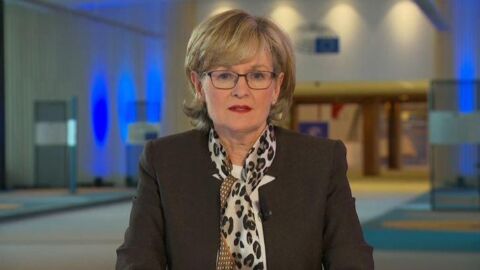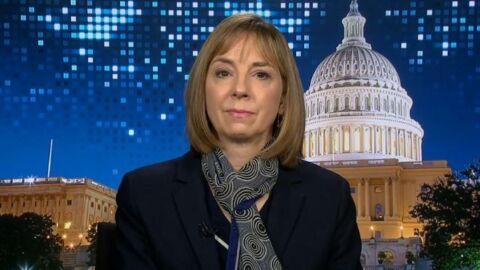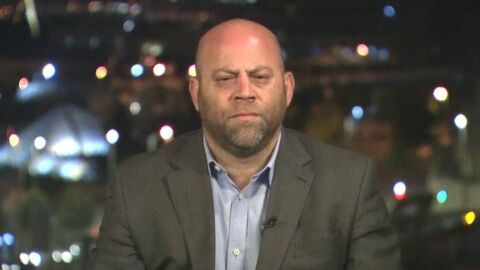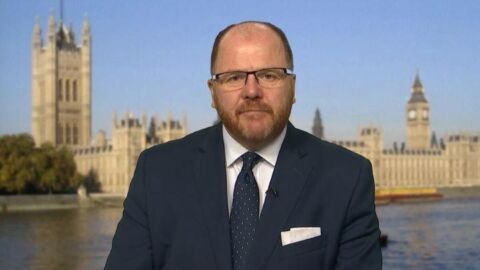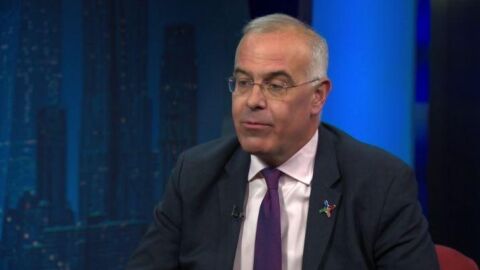Read Transcript EXPAND
CHRISTIANE AMANPOUR: “The New York Times” Columnist and Intellectual Conservative David Brooks was a proud passenger on the train of traditional conservatism. But it has long since left the station, and he has been left standing on the platform in some bewilderment. His new book, “The Second Mountain, The Quest for a Moral Life” is an intimate call for openness in an era of distrust. He spoke to our Walter Isaacson about it.
WALTER ISAACSON: Thank you for coming. Your new book really culminates a personal journey as well as a political journey we’ve been through. Tell me about The Second Mountain and what that mean.
DAVID BROOKS, AUTHOR, “THE SECOND MOUNTAIN”: Yes, that’s where joy is. I haven’t quite found it. But this book is about moral renewal, about how individual and societies turn themselves around. And my view is that the country is in a spiritual crisis and a moral crisis, as much as in economic and political crisis. The pain is being felt in suicide rates, in opioid addictions, in highest depression rates, and just we treat each other badly. And so what we need is to move from a culture of a hyper individual to something else. And the people I’ve most admired are those who rebelled against a central liner culture. And the liner culture is I can make myself happy. If I just make a little more money, a little more fame, lose a little more weight, I can make myself happy. No, it’s not — you can’t make yourself happy. You can only receive happiness as a gift from others, that you can give to others and you receive from them. And the people who live their life, not for self but for relationship, they glow with an inner light and incandescence of moral joy. And I thought I have achieved way more success than I ever thought I would. But I don’t have that, I don’t have that moral joy. And I want to figure out how to get that.
ISAACSON: Ever since you left college and you worked for William F. Buckley, you have been part of an intellectual conservative tradition, sort of Edmund Burke tradition. And yet, that seems to have gone astray. Do you feel bad about the way the Conservative Movement moved us to this society we’re in now?
BROOKS: Yes. I would say my conservativism doesn’t have anything to do with what we call conservatism. My conservatism has two strands. One is Edmund Burke who believed in epistemological modesty, the world is really complicated. We have to be very cautious about what we think we can now. And the second hero of mine is Alexander Hamilton who’s a Puerto Rican Hip Hop star, who believed in using government to give young poor boys and girls a chance to succeed. And that was a Conservative tradition but it is not today’s conservatism. And so one of the things that happened to me in my life is that I worked at “National Review”, “The Weekly Standard”, “The Wall Street Journal” editorial page. I was in the community.
And I was in that community for many years. And then conservatism sort of shifted and I stayed the same, in my view. It shifted over in the Trump direction or Newt Gingrich direction. And my life sort of drifted away and it drifted away from a lot of my friends. And it happened to me at a time when my marriage was ending, when my kids were leaving college. So all at once in 2013, I was like alone. And I went through a valley as we all go through valleys. And so I had to figure out what’s my life really about.
ISAACSON: You talk about being in a valley. And in the book, you kind of connected to the social valley that we all are in as a nation. How did we get there? And is your personal path a way to help us get out?
BROOKS: Yes, I’m no one special. Like my whole career is based on the idea that I’m a very average person with above average communication skills. And so I was going through a crisis of disconnection, a crisis of not being surrounded by really strong relationships. Well, guess what, so is our society. If you look at 45,000 people killing themselves every year, 72,000 dying with opioid addiction, if you ask Americans do you trust the people around you, a generation ago people trusted the people around them. Sixty percent said “Yes, people around me are trustworthy.” Now, it’s down to 32 percent and 19 percent are millennials. The younger you go, the more distrusting they are. And that’s not because it’s perception, it’s reality. People are treating each other badly. And to me, the cultural problem is the core problem, that we had a culture back in the ’50s which was very collective, we’re all in this together. And if you lived in Chicago, you didn’t say I from Chicago. You say I’m from 59th in Pulaski because that crossroad was your — that was your hood, and those were your people, and they had a strong community.
Unfortunately, that culture tolerated racism, sexism, anti-Semitism. So we had to destroy it. And roundabout the ’60s, we created a different culture which is not we’re all in this together, it was I’m free to be myself. I just want to be myself. And it was about personal freedom, self-actualization, and there was a right-wing version which was economic freedom, economic individuals. And there was a left-wing version which is a social and moral individualism but it was all individualism. And if you have 60 years of hyper individuals and where it’s all about self-actualization, self-expression, liberation from constraints, you’re going to wind up destroying the bonds between people. And that’s what we’ve done. And so to me, what we do as a society is we create cultures that solve our problems at the moment. Our problem at the moment is bad relationship, too much individualism and we’ve got to solve it. And I think, me personally and the country naturally, it’s the same process. How do you get to a spot where you can really live in deep relationship?
ISAACSON: Even before Donald Trump hijacked, as you say, the conservative ideology, do you worry that you and others in that movement celebrated economic individualism that you’ve now started to decry?
BROOKS: Yes, we had a bad model of human nature and we accepted a bad model of human nature. And that model was we’re self-interested utilitarian driving creatures. And the three desires we really have, that humans have, is desire for status, money, and power. And that’s the kind of philosophy you get where a bunch of alpha males are running the discourse and they don’t even see the nature — the web of relationships that women are building all around them.
And so I’ve spent the last year traveling the country being with people who are building relationship in community. There is a woman who I met in your city in New Orleans who, her name is Lisa Fitzpatrick. She was driving. She turned and she saw a 10-year-old kid, an 11-year-old kid who looked terrified. They lifted the gun and they shot her in the face. And she just remembers not the getting shot, but the terror in their eyes. And she said we’re all part of a war that they didn’t start and that I didn’t start. We’re victims of this war, which is they were doing a gangland initiation ritual. And so instead of being angry with what they had done, she said I’m going to work with gang members. And then she opened her home to 35 kids in her neighborhood who are just part of her second family. And one afternoon, she’s sitting around her home and she went to the 35 kids who were hanging around the den. And she said why are you here? And they said, “Because you’re the only one who opens the door.”
And so they’re looking for community. And she is building those kind of relationships.
ISAACSON: You have created a project called the Weave Project, which sounds like connect, and I think you’re wearing the logo of it. And my old shop, the Aspen Institute is supporting it. Tell me why you’re doing that and what it is.
BROOKS: Yes. It’s part of the same process. And socialization is the core problem in society. And all around the country, people are solving it. And these weavers are living and they’re creating connections with one another. And some of them have been through terrible valleys. I had a serious interview with a woman named Sarah Adkins in Ohio. She had come home one day and found that her husband had killed their kids and himself. And she now runs a free pharmacy. She teaches students at Ohio University. She helps moms who’ve been through violence. And she said, “I was motivated because I was angry. Whatever that guy tried to do to me, screw you, you’re not going to do it. I’m going to lead a life of purpose and meaning.” And her life is a life of giving herself away. And we find these people everywhere. Their lives are just service. They say I plant myself in my place. I met a guy in Youngstown, Ohio who just held up a flag and said, “Defend Youngstown.” He was just going to be there for his place. I had — when I was in my bad, period, there was a group — there’s a couple named Cathy and David who live in D.C. and they had a friend in the D.C. public schools. And that kid had a friend who had no home. His mom had some drug and health issues. So they said, “Well, James can stay with us.” And then James had a friend and James had a friend. And then five years ago, when I first went to dinner on a Thursday night, there are 40 kids around the dinner table and 10 or 15 sleeping around the house.
And I walk in there. And I reach out to shake one of the hands of one of the kids. And he says we don’t shake hands here. We just hug here. I’m and not the huggiest guy on the face of the earth. But for five years, I’ve been going back every Thursday to that house. And they just offer love and they turn to you and they demand love from you. And they teach you how to do relationships. You just have to get — to do relationships well, you have to get to a deeper level of yourself and be willing to open up that level.
ISAACSON: And if we have that ability to care for each other, do you think that heals our politics?
BROOKS: Yes, I have total confidence. There’s a woman who has a theory of social change which she calls the ratchet hatchet, pivot ratchet that society has problems. So we solve the problem by creating a culture that shapes how we behave and it works for a little while. But then it stops working. Individuals doesn’t work for a while. We needed individualism to give us the feminism, civil rights, Silicon Valley. But then it stops working and you then have to chop it up, hatchet. And those hatched periods can be very bumpy. 1968 was a hatchet period. We’re in one today. 1848, you think everything is falling apart. But human beings have the ability to figure stuff out. And I see all around the country this movement that doesn’t know it’s yet a movement, these weavers. And they are creating culture and relationship around intimacy, around vulnerability, around community. And it’s happening from the ground up. And as it says in the Bible, the sparks fly upward.
ISAACSON: Tell me about your spiritual journey.
BROOKS: I grew up here in New York City where we’re talking about 50 blocks south of here. I grew up in a Jewish home. And my immigrant family culture, chicken business on the lower east side, that is deep in my bones. The Jewish story is an Exodus story. It’s a story of leaving the wilderness, escaping oppression, and coming into the settled — the promised land and trying to settle it. And I was raised with the Exodus story. Then I went to a school called Grace Church School which is an Episcopal school where I sang in the choir and learned Lord’s Prayer. And then I went to — for 15 years, really my childhood was spent at a place called Incarnation Camp. And so I had two cultures I was in. One was the Jewish culture that culture is a home culture of what they call love and kindness. I always say every church service I go to is more spiritual than every Synagogue service. But every Friday night Shabbat meal is more spiritual than every church service. Around the Shabbat meal, the family’s gathered. There are 18 people around there. They’re all talking at once. They’re all correcting the 17 wrong things the other person just said. There is a layer of spiritual solidarity that is created by Jewish culture. And that’s one kind of goodness.
And but then at camp, I found another kind of goodness which was self- sacrificial love. I know that in Wes Wubbenhorst who was a counselor of mine and then a colleague and he was just pure innocence. He was like a man-child and he was that way all his life, just filled with delight in the universe, just filled with love for others. Did not think about himself. Just a life of pure delight. And in the course of his life, he became an Episcopal minister and he did hard stuff. He worked in Honduras. He helped women survive domestic violence. But he remained just a life of giving himself away. And to me, that is sort of a Christian kind of goodness of agape, of sacrificial love and joy is found in the far side of self-sacrificial service. So I had both things in my mind. And they have pretty much stayed in my mind.
ISAACSON: Is there a way as a leader of the Conservative Intellectual Movement for so many decades that you can see how you could recapture conservative thought in a post-Trump era?
BROOKS: I wouldn’t bet on it. I think the Republican Party is permanently altered. But I mentioned earlier that my hero is Edmund Burke, and Edmund Burke created the phrase “Little platoons”. And by the little platoons, he meant civic society. He meant go to church or Synagogue. He meant your neighborhood association. He meant your second family. And he also said that what really matters in society is not laws but morals. If you get the morals right, then you get society right. Somebody else, Samuel Johnson has a couplet, “Of all the things that human hearts endure, how few are those that kings can cause and cure.” Meaning politics does some things in our life. But really important things in our life is our relationships and our character. And that I think was a conservative emphasis. And so all of these things were conservative emphasis and then institutions, the power of the institutions of our life. I was shaped by the place I went to college, the University of Chicago in ways that I don’t understand even today. And I just passed for an institution and it transformed me. And I’m forever haunted and grateful for that institution.
You meet somebody who is a Marine, you always know they’re a Marine. A more houseman, you always know they’re more houseman. They were shaped by these institutions. And so the conservative emphasis is supposed to be on manners, morals, institutions, and local communities. And that’s more needed than ever. Unfortunately, under Donald Trump, conservatism and maybe under “Fox News”, it’s become white identity, building walls, or economics. And that is hollowing out what conservatism is supposed to be.
ISAACSON: One of the things that’s been part of our politics for many years, culminating with the Mueller report is sort of the scandal nature of it. There were always fighting scandal versus scandal. Do you think maybe we should take a Sabbath from scandal-mongering?
BROOKS: Yes, ever since Watergate. Watergate was we need to get rid of Nixon. I really was a kid. I love all the Watergate books, I read them all. But it held forth the tantalizing prospect that you need to argue against your opponents. You didn’t need to persuade people about the rightness of your side. You could just destroy your opponents all at once through scandal. And so we have developed — I saw a “Politico” story, the number of times – – the different scandals where somebody said, “This is worse than Watergate.” And so there are 46 of those leading up right to Russiagate and whatever. It’s always worse than Watergate. And so we just think we can destroy the other side and it turns into this game of moral one-upmanship and a callout culture where we’re not just two sides of the same argument or different sides of the same argument. I’m moral, you’re horrible.
And it’s given us the illusion that we can win a final ultimate victory in politics. You cannot win a final ultimate victory. Politics is a competition between partial truths. Usually, both sides have some pieces of the truth and you’re just trying to find the right balance at that moment. And this scandal culture has turned us into sort of blood thirsty, we’re going to destroy you culture.
ISAACSON: Over the years, you have been a person on the right in the new “PBS Newshour”. There’s always — everything got filtered through a left and a right. And by being that person on the right, do you think that you and that sort of system helped contribute to the polarization we feel?
BROOKS: I’m struck by the power of label. I have the label conservative. And so there are some people that my readers in “The New York Times” and maybe viewers on the “Newshour” going to think, “Oh, he’s conservative, therefore he’s on the same team with Laura Ingraham or Ann Coulter. And there’s no difference between them, they’re on the same team.” But I think I try to think, I try to explain the world I have a certain world view. And I used to — when I started my column, I said I have to represent the team’s viewpoint. But then I got so alienated from the team, I said I’m just going to say what I think and I’m not going to try to represent the viewpoint.
And so I’ve wondered and some people see me less conservative. In some ways, I’m maybe more conservative, communal. But to reduce each other to labels and to teams, that is just turning politics into triumph. And there are so many spots along all the continuums. Each of us represents a spot, not just a click, not just a label. And so many of our problems in our society are caused by bad stereotyping. We stereotype each other. And we assume we know one thing, therefore we know everything. Everybody is way more complicated than that stereotype.
ISAACSON: Do you still consider yourself a conservative?
BROOKS: Not in the — I mean I now — I think I’m labeled moderate because I do think politics is about partial truths. And the left — I moved so far left on economics. I’ve moved a little right on social issues actually. But what the world calls conservative, I’m not at. I don’t get invited to speak at the Conservative Political Action Committee. I don’t get invited to appear on “Fox News”. And so I guess I’m not that. But if Edmund Burke is conservatism, then hell yes, I’m a conservative.
ISAACSON: David Brooks, thank you so much for being with us.
BROOKS: Thank you. Thanks.
About This Episode EXPAND
Benjamin Netanyahu wins the Israeli election. Experts weigh in on how and when and even if Brexit will happen. Author David Brooks discusses America’s spiritual and moral crisis.
LEARN MORE
